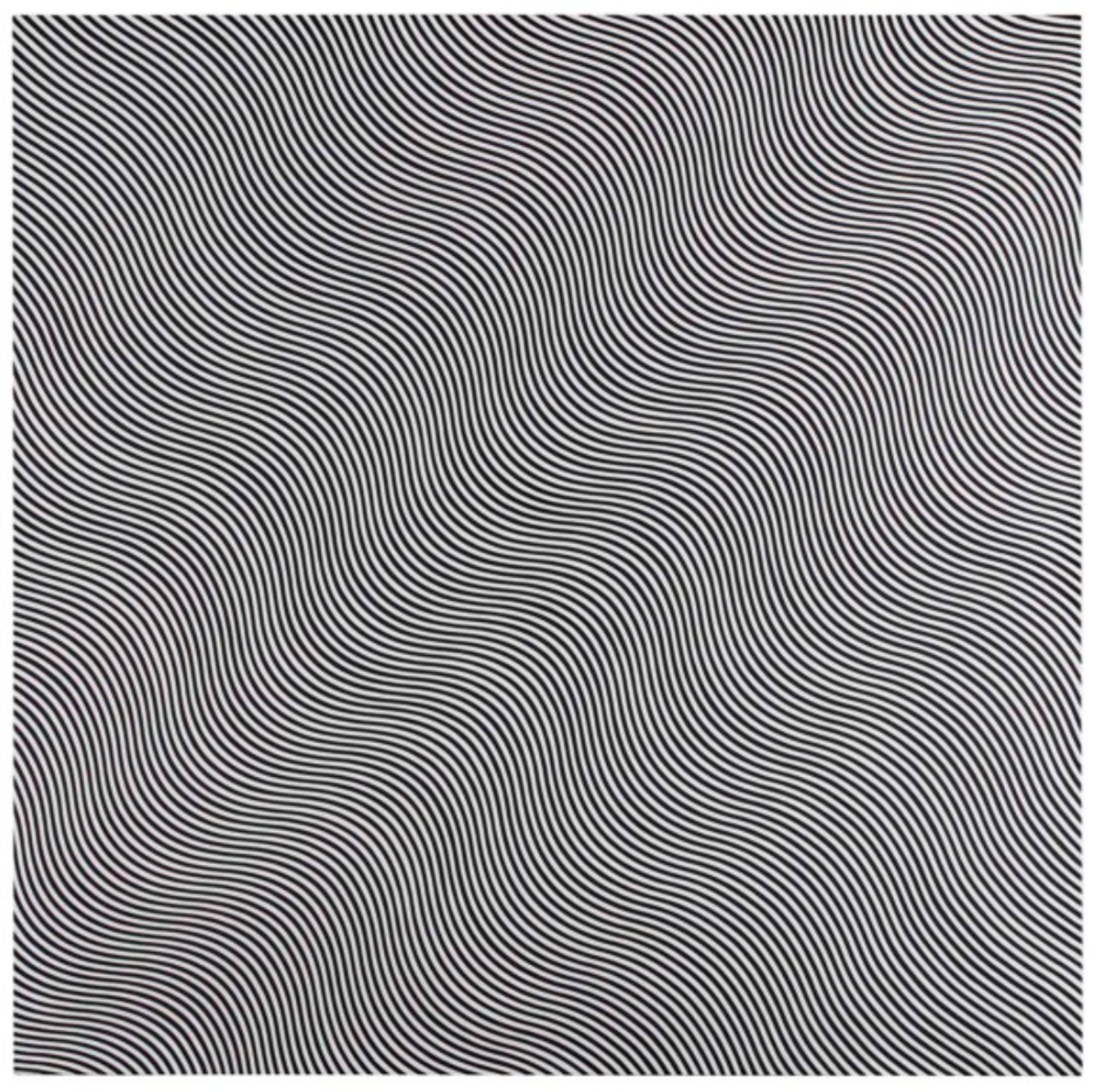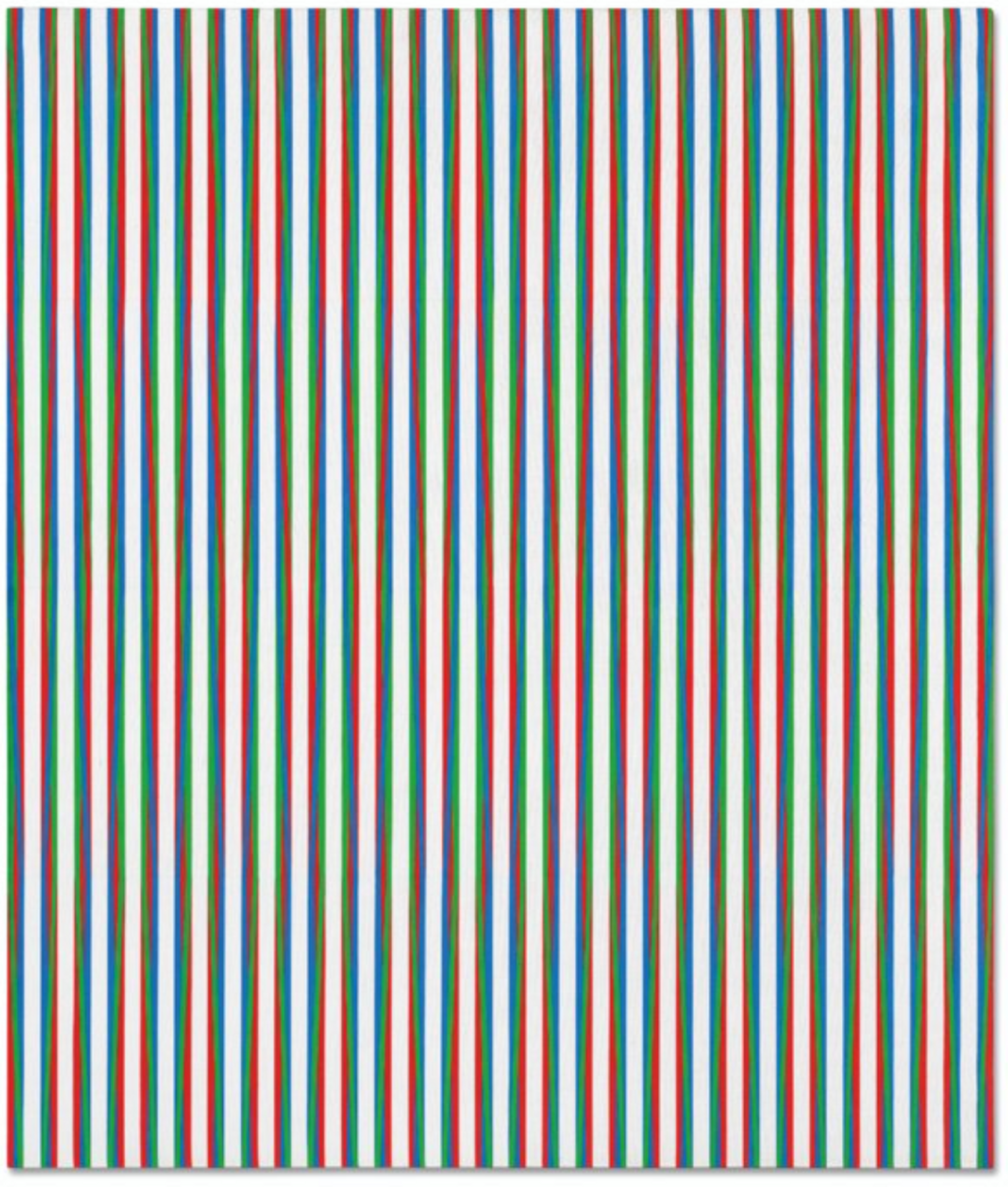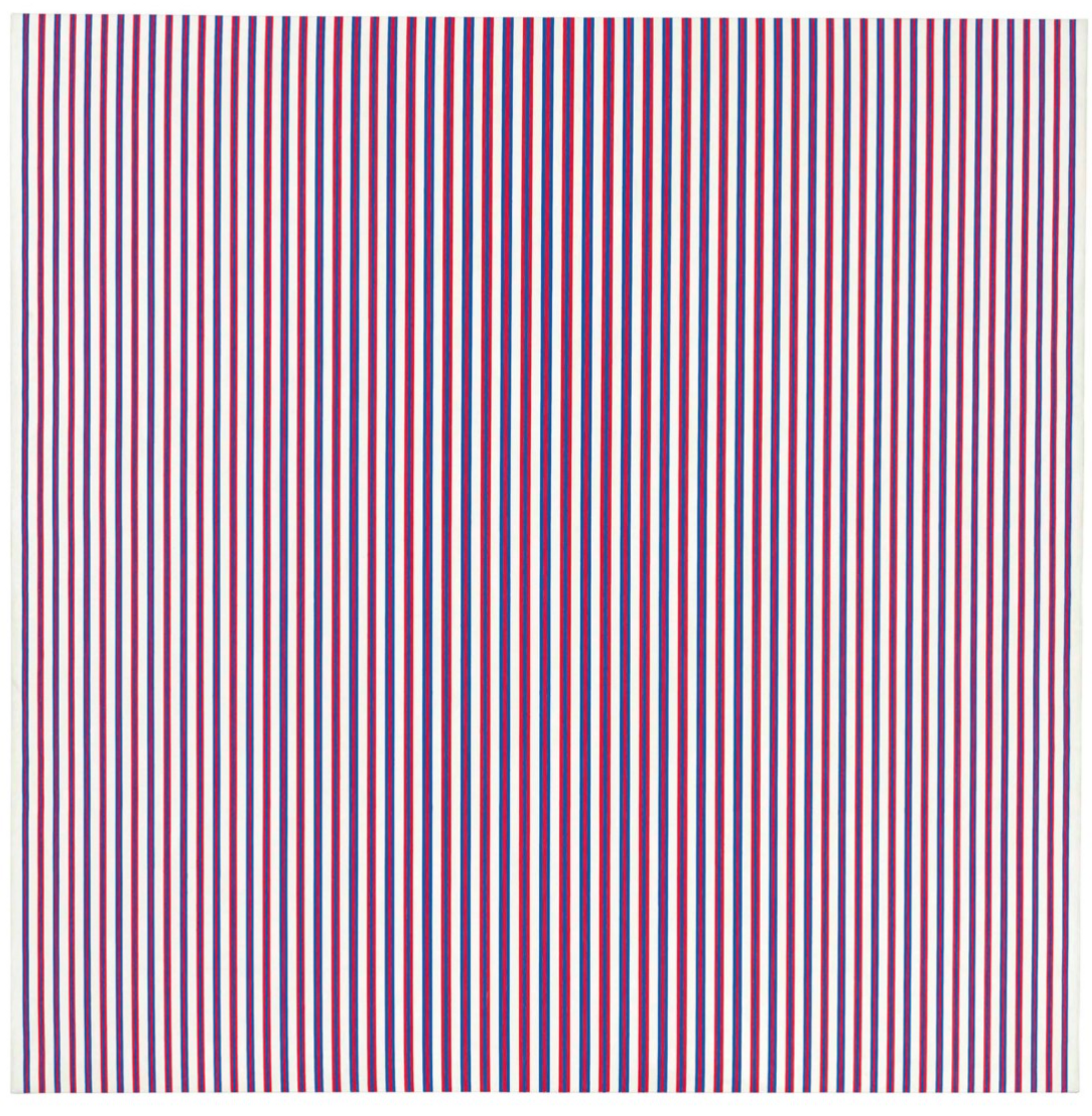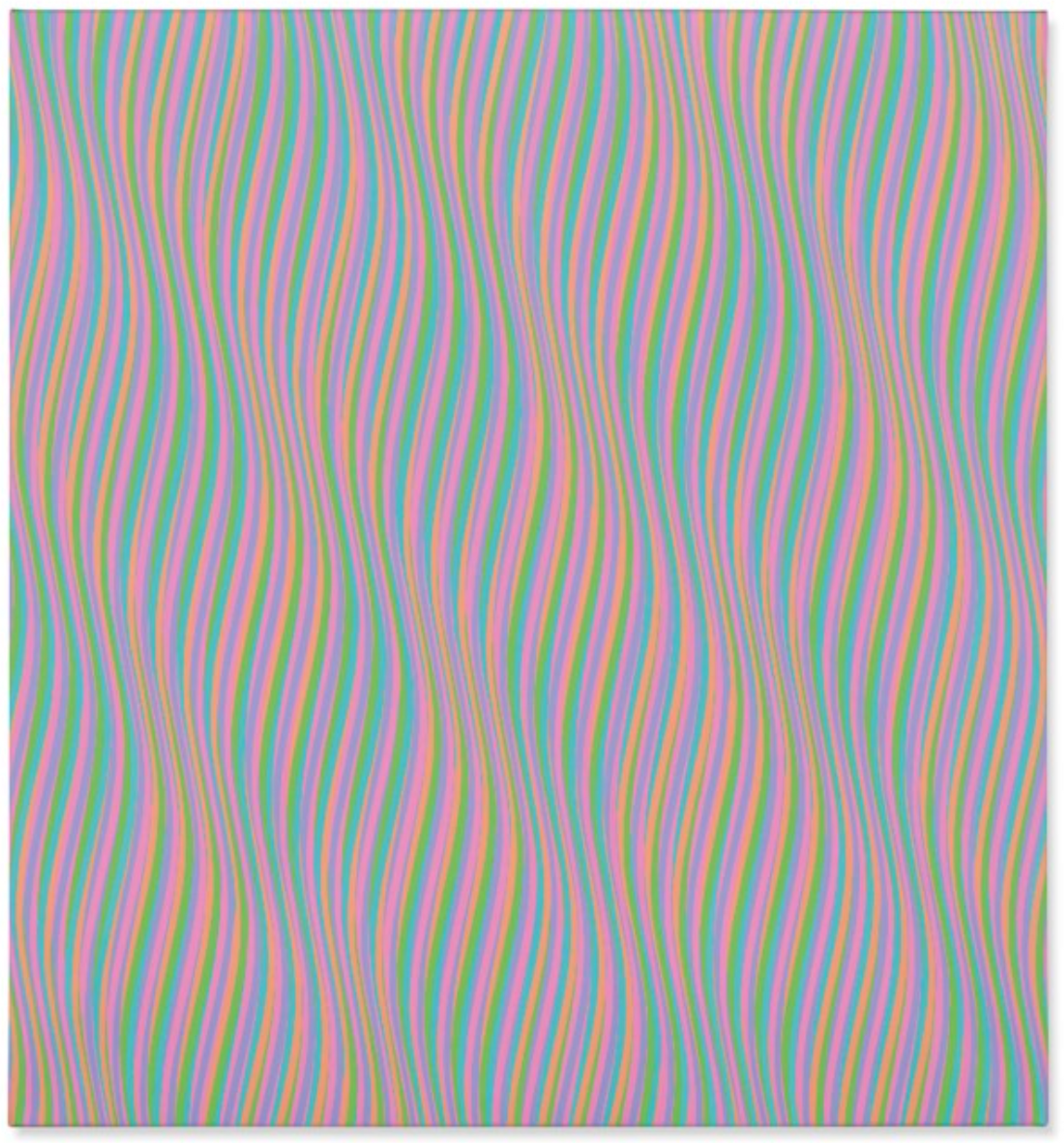 Fragment 2 © Bridget Riley 1965
Fragment 2 © Bridget Riley 1965
Bridget Riley
111 works
Bridget Riley's print market has nearly doubled in sales volume and lots sold over the past five years, with a consistent rise in average selling prices, reaching £11,222 across 65 lots in 2023. This growth reflects the enduring appeal of her vivid geometric art. While her paintings achieve multimillion-dollar prices at auctions, her prints offer a more accessible entry point for collectors and blue chip investment. This article examines the top prices paid for Riley's artwork on the public market.
£4.4M for Gala
 Image © Christie's / Gala © Bridget Riley 1974
Image © Christie's / Gala © Bridget Riley 1974Created in 1974, Riley's Gala (1974) explores vibrant colours to mimic the dynamic flow of a rippling prismatic surface, exemplifying the pinnacle of the Op Art movement and Riley's bold visual experimentation. During the 2022 Modern British Art Evening Sale at Christie's London, Gala significantly exceeded its estimated value of £3.5 million, fetching an impressive £4.4 million and setting a new auction record for Riley.
£4.3M for Untitled, Diagonal Curve
 Image © Christie's / Untitled (Diagonal Curve) © Bridget Riley 1971
Image © Christie's / Untitled (Diagonal Curve) © Bridget Riley 1971One of Riley's remarkable works, Untitled (Diagonal Curve) (1966), known for its visually captivating monochromatic illusion, exceeded expectations by selling for £4.3 million at Christie's in June 2016. This monochrome masterpiece, distinguished from her straight-lined counterparts like Zing 2 (1971), which realised just under £3.3 million in June 2021, highlights Riley's prominent role in the Op Art movement. With its dizzying array of seemingly oscillating forms, this artwork marks one of her final forays into black and white before venturing into coloured the following year.
£3.3M for Zing 2
 Image © Christie's / Zing 2 © Bridget Riley 1971
Image © Christie's / Zing 2 © Bridget Riley 1971Zing 2 (1971), a representative piece from Riley's body of work in the 1960s and '70s, remained hidden from the public since its creation, resurfacing at Christie's in June 2021. Surpassing its estimated value range, this artwork achieved £3.2 million. Unlike Riley's later, more curvilinear works from the 1980s onwards, Zing 2 displays a relatively subdued use of colour and vertical aesthetics. The painting showcases Riley's signature technical precision and semi-illusionistic geometric forms, emblematic of the Op Art movement.
£2.9M for Chant 2
 Image © Christie's / Chant 2 © Bridget Riley 1967
Image © Christie's / Chant 2 © Bridget Riley 1967Created in 1967, the year that marked Riley's transition to incorporating colour into her artworks, Chant 2 (1967) was first exhibited at the Venice Biennale in 1968. Acting as a conceptual link between Riley's earlier ventures into dizzying monochrome pieces, this artwork achieved a remarkable result, selling for over £2.9 million at Christie's in 2014. This early work by Riley, once part of the renowned collection of German art collectors Alfred and Elisabeth Hoh, had previously appeared at auction in 2008, selling for over £2.5 million. This recent sale marks a 16% increase in sales value.
£2.8M for Orphean Elegy 7
 Image © Christie's / Orphean Elegy 7 © Bridget Riley 1979
Image © Christie's / Orphean Elegy 7 © Bridget Riley 1979 Orphean Elegy 7 (1979) seamlessly combines two defining elements of Riley's illusonary body of work: the striking interplay of tessellating linear forms and the vibrant use of complementary and contrasting colours. Surpassing its £2 million high estimate, this artwork achieved £2.8 million at Christie's in 2019. This work showcases a kaleidoscopic and rhythmic composition, bearing witness to Riley's transition from simple verticality to embracing the 'curve' in the late 1960s. Initially recognised for her extensive exploration of monochrome, Riley later gained international acclaim for her chromatic works, often described as inducing a sense of 'vertigo.'
£2.7M for Shift
 Image © Sotheby's / Shift © Bridget Riley 1963
Image © Sotheby's / Shift © Bridget Riley 1963Confronted with the mesmerising and visually captivating and dimensional illusionary qualities of Shift (1963), one can readily understand why Riley is often hailed for her ability to make us acutely aware of our own perception. This remarkable artwork fetched a substantial £2.7 million at Sotheby's in February 2020, underscoring the enduring impact of Riley's early monochromatic pieces, which remain as impactful today as they were nearly six decades ago. A quintessential example of Riley's early work, Shift exudes an unmatched sense of dynamism, displaying the artist's initial preference for monochrome compositions.
£2.6M for Halcyon 2
 Image © Christie's / Halcyon 2 © Bridget Riley 1972
Image © Christie's / Halcyon 2 © Bridget Riley 1972Halcyon 2 (1972) is characteristic of Riley’s first interventions into the optically rich and tantalisingly bold sphere of colour. Product of her stepping outside of a previously monochromatic world, the painting is characteristic of an important phase in Riley’s career. Exceeding its presale estimate in October 2021, this works sold for £2.6 million at Christie’s. Previously the property of Galerie Beyeler in Basel, Switzerland, the work is testament to Riley's close attention to graphic detail.
£2.4M for Delos
($20,945,000 HKD)
 Image © Sotheby's / Delos © Bridget Riley 1983
Image © Sotheby's / Delos © Bridget Riley 1983 Created in 1983, Delos features bold, vibrant shades of blue and green, accented with white and warm tones to create depth and an illusionary effect. This piece belongs to a period in Riley's career known as her Egyptian Aesthetic, inspired by the colours of Egypt and marked by a dramatic shift to vertical coloured stripes. Similar hued palettes are found in her prints like RA 2 , Slivered 2, and Achæan, all created in 1981 and highly sought after in the current market. This palette became significant, extending into the following decades of Riley's work. Delos sold for £2.4 million at Sotheby's Hong Kong in October 2022.
£2.3M for Tinct
 Image © Sotheby's / Tinct © Bridget Riley 1972
Image © Sotheby's / Tinct © Bridget Riley 1972 Tinct (1931) is a vibrant exploration of colour, featuring parallel vertical lines of varying widths that intersect at different angles to create a series of rhombus shapes. The varying line thicknesses and strategic placement form a dynamic geometric pattern of elongated shapes, giving the composition a sense of depth and movement. As a significant work in her career with an ambitious exhibition history, Tinct sold for £2.3 million at Sotheby's in June 2022.
£2.3M for Gaillard
 Image © Christie's / Gaillard © Bridget Riley 1989
Image © Christie's / Gaillard © Bridget Riley 1989A foremost example of Riley’s oeuvre, Gaillard (1989), is a lively and effervescent work sold in February 2020 for nearly £2.3 million at Christie’s. The kaleidoscopic energy posed by the painting’s exploration of hard-edged form, is a testament to it’s auction success surpassing the high estimate by 14%. While distinctly divergent from the artist's earlier monochromatic works, Gaillard still maintains a fundamental focus on visual perception. Comprising an array of coloured rhomboids, referred to by Riley as 'zigs,' this artwork elicits a range of optical effects for the viewer to experience.


